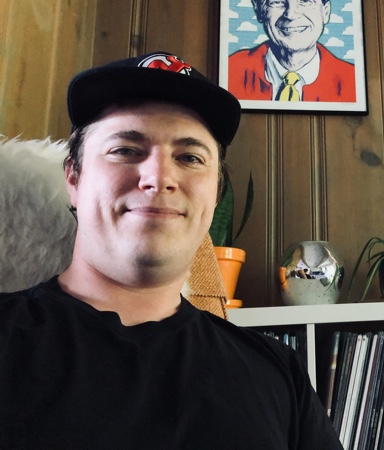Where are you based?
I am based in Yonghe, a small yet bustling district just south of Taipei, Taiwan. If you don’t know much about Taiwan, just remember that it is renowned for being the birthplace of bubble tea and the home of TSMC.
Where do you work? What do you do?
I am the founder and journalist of 22CS (short for 22nd Century Satellite), Taiwan’s first music industry newsletter and online community. I got inspired by Water & Music, Stratechery, and so many pioneers and decided to launch this venture in January 2023 when I was out of work and figuring things out. Newsletter business is still pretty new in Taiwan, and focusing on the music industry is so niche that you wouldn’t really expect it to be profitable. Even though I can’t fully rely on it for a living yet, after a year of market testing, I see its economic and intellectual potential. This is significant, especially in an era where traditional music journalism is struggling.
Besides that, I’m into all sorts of freelance work in this field. Translating articles for media, reviewing music for a DSP, doing loads of copywriting and press releases for artists and labels, and even curating panels for music festivals.
What are you listening to?
I listen to two types of music: the first type is the music that moves me, which is predominantly black music like R&B, soul, jazz, and others. I indulge in both old and new tracks from these genres. Recently, I’ve expanded my interests to include electronic music, so it’s now part of what moves me. For a glimpse into my 2023 favorites, you can check this article.
The second type is the music that moves the world. I’m fascinated by why certain songs or genres become popular, even if they don’t personally resonate with me. As a journalist, it’s part of my job to dissect these trends and the cultural narratives they carry.
How do you discover new music?
I worked in a record shop when I was in college. And around the same time, I got into downloading endless tracks using P2P software. That’s when I developed a knack for sifting through vast amounts of new music, whether it was boxes of CDs or folders of MP3s, patiently listening to and categorizing them in my own way. I’ve rarely relied on algorithms.
Last year, I regularly visited Every Noise at Once every Friday to browse the latest releases in my favorite genres. However, since the site’s updates halted after its owner was let go by Spotify, my weekly music discovery has significantly narrowed. Now, I primarily depend on a variety of curators for new music, including Bandcamp Weekly, NPR Music’s New Music Friday, Pitchfork, First Floor, and the ‘New Releases’ sections on various DSPs.
Additionally, I subscribe to DSPs from different countries—Spotify in Taiwan, Apple Music in Japan, Tidal in the US—to get a sense of the music curated in different countries.
What formats do you usually listen to? LP, CD, Cassette, Digital, Streaming Services? Why?
Streaming is now my go-to format for daily listening. I still have a sizable CD collection, with more than half being R&B/soul albums released between 1960 and 2020, many of which are quite rare. I’ve also toyed with the idea of getting a turntable. Yet, with the vast amount of music I need to go through, sticking to physical formats is becoming less viable for me, both in terms of cost and space.
“Streaming is now my go-to format for daily listening. I still have a sizable CD collection, with more than half being R&B/soul albums released between 1960 and 2020, many of which are quite rare.”
Where do you do most of your music listening?
Being a freelancer and self-employed, music is my constant companion, provided it doesn’t interfere with my work. My desk is equipped with Neumann KH120 A studio monitors, purchased initially for music production. For more focused listening, I turn to my Beyerdynamic DT 770 PRO headphones. Outside, my AirPods Pro, with noise cancellation activated, is my go-to.
How do you find and listen to pre-release music?
I receive pre-release music, including demos, from the artists and labels I work with for copywriting. This access helps me grasp their artistic directions and prepare for interviews. Additionally, my freelance role writing music reviews for a DSP allows me substantial access to pre-release tracks.
What are your frustrations with listening to music digitally? Any benefits?
There’s one thing that really bothers me: I don’t understand why so many people use Google Drive to share music. It’s prone to leaks, and its built-in player is extremely inconvenient to use.
Digital music allows us to access almost any song we want without worrying about the cost or space needed for physical storage. If I had to purchase physical copies of every album I’ve listened to digitally, I’d be bankrupt and would need a mansion to store them. However, acquiring, listening to, and collecting physical albums demand a level of effort and commitment, imbuing them with special significance and value. In contrast, the convenient, nearly weightless, and cost-free nature of digital music can make it feel less significant and somewhat disposable.
How do you keep track of everything you are listening to?
I utilize an automation service called IFTTT, which has a handy applet named ‘If a new saved album, then Create record.’ This applet automatically creates a record in my Airtable account whenever I save an album on Spotify. The record captures four essential pieces of information: the artist name, album title, cover art URL, and a timestamp. Additionally, I manually input other details like release dates and genres into the database, which helps me organize and easily retrieve the information later.
For individual tracks, I use a service called Zapier that functions similarly. When I like a track on Spotify, Zapier creates a corresponding record in a different Airtable database.
The main limitation of my system is its dependency on Spotify. I’m still figuring out how to track music that’s not available on this platform.
Do you tip other people off to new music? How?
In the weekly digest of my newsletter, I include a section dedicated to new music recommendations, where I write a short paragraph about each new album I’ve personally enjoyed. Aside from that, I rarely share music recommendations casually. This is because I’m aware of the overwhelming amount of information vying for our attention daily, and I prefer not to add to that noise. Instead, I value having a dedicated space—my newsletter—where subscribers can engage with my content in a mindset prepared for discovery.
Anything you want to “promote”?
A fun fact: Despite its relatively small population, Taiwan boasts one of the world’s most eclectic music scenes, enriched by a blend of Eastern, Western, and indigenous traditions. Moreover, the government’s generous policies and subsidies make it one of the most supportive environments for the music industry. For firsthand insights, consider subscribing to my newsletter (more content in English to come!) or feel free to contact me directly.




